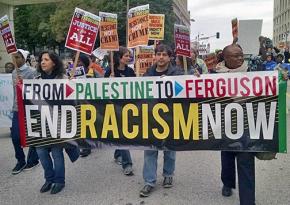When we fight together, we all win
More than 1,000 Black activists, scholars and organizations have released a historic statement of solidarity with Palestine against Israeli oppression. The statement is both an expression of international solidarity and an inspiring collection of some of the best-known African American voices, including Angela Davis, Mumia Abu-Jamal, Talib Kweli, the Dream Defenders, the Malcolm X Grassroots Movement and more.
Khury Petersen-Smith, one of the initiators of the statement and a SocialistWorker.org contributor, talked to Australian socialist about why he decided to help lead this effort, in an interview published at Red Flag.
WHAT PROMPTED you to be part of producing this statement?
THE IDEA came last year, during Israel's catastrophic bombing of Gaza. The Ferguson uprising took place in the midst of it, and Palestinians produced two statements of solidarity with Ferguson and the Black struggle in the U.S.
In recent years, there have been growing numbers of prominent Black activists and intellectuals--like Alice Walker, Angela Davis and Cornel West--speaking out very vocally for Palestine. There was also a brilliant piece in Ebony magazine, the most widely circulated Black publication in the U.S., on why "Black people must stand with Palestine."
There was an opportunity to produce a statement that expressed the growing Black solidarity with Palestine and garnered more. Kristian Davis Bailey, the author of the Ebony piece, had the same idea, and the two of us began working on the same project independently and unbeknownst to each other!
An activist who we both knew introduced us to each other, and we decided to co-organize one statement together. We circulated it and published it on the first anniversary of the attack on Gaza. Since last summer, not only has there been a new wave of struggle against anti-Black racism in the U.S., but also very visible solidarity between the Black and Palestinian struggles.

There were Palestine contingents in Ferguson and at Black Lives Matter protests elsewhere, and delegations of Black activists to Palestine as well.
WHAT WAS the process of collecting signatories?
KRISTIAN AND I each knew some prominent Black activists and scholars who we reached out to. We have been involved in Palestine solidarity, Black Lives Matter and left organizing, so we sent the statement through our networks.
We approached key leaders, like Angela Davis, Cornel West and others, and key organizations, like the Dream Defenders--all of whom signed on. With their signing, as well as Mumia Abu-Jamal, we reached a tipping point at which more people knew about it and signed on. We are excited to say that, ultimately, people from 25 different countries signed on, including Australia.
WERE THERE any debates within either the Palestinian solidarity or the Black Lives Matter campaign about the production of the statement?
WE HAVEN'T directly encountered debates in producing the statement, though the question of whether oppressed groups of people should stand in solidarity with each other's struggles is very much contested. We hope this is a contribution in favor of seeing solidarity as something that makes our movements stronger and is necessary if we are actually going to win liberation.
WHICH POLITICAL questions come to the fore in this convergence of movements?
TAKING AN honest look at the plights of the Palestinians and of Black people in the United States raises fundamental questions about both U.S. and Israeli society. You have two oppressed populations whose control was a central question for the founding of each state--and has been ever since.
So there are all kinds of relevant questions that come up when looking at the connections between Zionism and anti-Black racism, such as the fact that the same U.S. police departments that terrorize Black people routinely train with Israeli police and occupation forces, who excitedly share their notes on terrorizing Palestinians. But on a deeper level, both the Palestinian struggle and the Black freedom struggle in the U.S. expose the fact that both the U.S. and Israel are racist projects at their cores.
WHY IS international solidarity so important for the Black Lives Matter campaign?
BLACK STRUGGLE in the U.S. has always been a source of embarrassment for the U.S. elite on the world stage because it cannot get away with declaring the U.S. to be "the land of the free." That was true during the days of slavery, of Jim Crow segregation, and it remains true today. When the U.S. loses its credibility among people around the world as "the world's greatest democracy," that can only help our struggle here.
But just as international solidarity has helped the Black struggle in the U.S. historically, that struggle has inspired and contributed to resistance around the world. Black struggle in the U.S. in solidarity with struggles of oppressed people internationally is of mutual benefit to all of the struggles involved. When we fight alongside each other, we all win.
First published at Red Flag.


